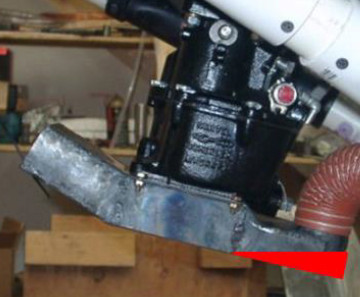Source: 2015 Q4 Beartracks, Russ Erb
Recently I had a very odd transitory problem with Three Sigma. I flew it on a Monday and put it away. I came back to do something on Tuesday and it was fine. Then on Wednesday I went to the hangar and there was a large blue dye spot in the oil drip pan under the engine. It had suddenly developed a large fuel leak. While trying to find the source of the leak, a "large" amount of fuel came pouring out of the cowling (probably just a few ounces, but disturbing nonetheless). It stopped before I could figure out where it was coming from. I checked the fuel inlet fitting (which had sprung a leak before) and it was dry. Everything else on the outside of the carburetor was dry.
For some reason, I thought to check the carb air box through the carb heat exit hole. I was greatly surprised to find the rear half of the carb air box full of fuel. The fuel I found is represented by the red triangle on this picture of my carb air box. As best I can tell, the fuel leak may have been a problem with the float shutoff valve releasing fuel into the carburetor barrel which ran down and some of it collected in the air box. Apparently the problem magically fixed itself (always weird) because there has not been a single drop of fuel leaked in four days since the initial problem, even with the Mixture Full Rich and the auxiliary fuel pump on.
However, this experience highlighted a much bigger potential problem. It is possible through a failure in the carburetor, or even just over-priming or otherwise flooding the engine, for fuel to collect in the rear part of the carb air box. At best, when I test carb heat that fuel will get pulled into the engine and flood it. At worse, the heated air (for carb heat) flowing over the fuel would blow it around the cowling and eventually the fuel would catch fire.
The solution was very simple-the carb air box needed a drain hole, so that fuel would not have a chance to accumulate in a large quantity. I drilled a #40 hole at the back of the air box. Yes, there will be a little bit of air leakage through the drain hole, but comparing a #40 hole of cold air to a 2 inch SCAT of heated air, I figured the difference would be imperceptible. Problem presumed solved.
Apparently the problem magically fixed itself (always weird) because there has not been a single drop of fuel leaked in four days since the initial problem, even with the Mixture Full Rich and the auxiliary fuel pump on.
However, this experience highlighted a much bigger potential problem. It is possible through a failure in the carburetor, or even just over-priming or otherwise flooding the engine, for fuel to collect in the rear part of the carb air box. At best, when I test carb heat that fuel will get pulled into the engine and flood it. At worse, the heated air (for carb heat) flowing over the fuel would blow it around the cowling and eventually the fuel would catch fire.
The solution was very simple-the carb air box needed a drain hole, so that fuel would not have a chance to accumulate in a large quantity. I drilled a #40 hole at the back of the air box. Yes, there will be a little bit of air leakage through the drain hole, but comparing a #40 hole of cold air to a 2 inch SCAT of heated air, I figured the difference would be imperceptible. Problem presumed solved.
This article is available for purchasers of 2015 Beartracks access. Click here to purchase access or validate your prior 2015 subscription. Multi-year bundles are available here.